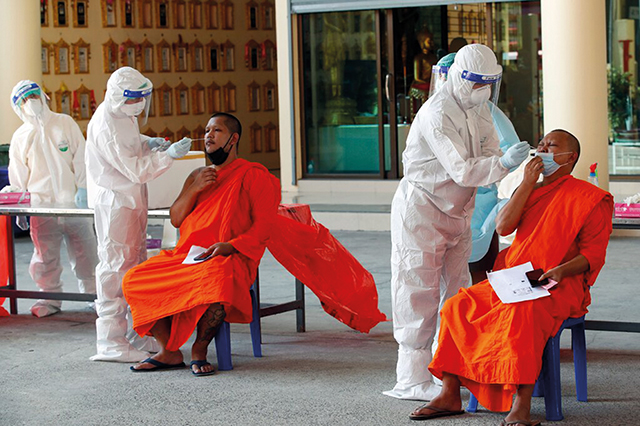On Thursday, May 13, the nationwide public holidays aimed at reducing mobility across the country ended, with municipal transport and schools resuming operations in a normal regime.
The government lifted all restrictions imposed during the May 3-12 period, however, the restriction on movement from 9 pm to 5 am, and the limits to serving in restaurants at the weekend remain in force.
Despite the lockdown on municipal transport and schools for 10 days, the corona case numbers still remain higher than ideal. The statistics show that Georgian capital Tbilisi continues to record the daily highest number of COVID-19 cases.
Georgia reported 1788 coronavirus cases, 1251 recoveries, and 31 deaths on Tuesday, with 28,532 tests conducted across the country. 963 new cases were recorded in Tbilisi.
The country then reported 1409 new cases, 1256 recoveries, and 27 deaths on Wednesday, with 40,275 tests conducted in 24 hours. Tbilisi recorded 744 cases.
The numbers were slightly lower again on Thursday, with the country recording 776 coronavirus cases, 1,329 recoveries, and 16 deaths, with 31,982 tests conducted.
That day, the Georgian capital recorded the highest number of 359 Covid-19 cases within 24 hours, followed by the Samegrelo-Zemo Svaneti region with 84 cases and the Imereti region with 81 cases.
The total number of confirmed cases since February 2020 has reached 326,441, among them, 306,264 people recovered and 4379 died.
The daily test-positivity rate on Thursday stood at 2.43%, down from 5.56% over the past 14 days.
The Vaccines
To date, 77,343 Georgians have received a coronavirus vaccine from AstraZeneca, Pfizer or Sinopharm.
This week, it was announced that the AstraZeneca vaccine age group had been reduced to 45 years, and since Wednesday, citizens over the age of 45 have been able to register for it.
Prior to this, based on a decision made by the Immunization Council on April 8, AstraZeneca jabs could only be given to those over 55.
On May 6, 43,000 doses of the AstraZeneca vaccine arrived in Georgia, sent by the COVAX platform. These doses are intended for those who have already received the first dose of the AstraZeneca vaccine.
On May 12, the registration for the second dose of Sinopharm was opened. The population can be vaccinated with a second dose of Sinopharm after May 25. Georgia is expected to receive new doses of Sinopharm in June, while more Pfizer jabs will arrive in July.
Vaccination registration portal: https://booking.moh.gov.ge/. The COVID-19 Vaccination Information Hotline 1522 is open weekdays, from 09:00 to 23:00.

Coronavirus Cases Fall Globally, but the Virus Is Surging in Countries that Lack Vaccines
Recently, the coronavirus cases and deaths globally have been showing a decreasing trend. However, the situation in India and Asian countries in general remains severe.
“After a devastating year with wave after wave of coronavirus infections around the world, new cases and deaths are falling in many of the Western nations that were once among the hardest hit. But while the virus recedes in wealthy nations with robust vaccination campaigns, it is pummeling India and threatening to swamp Southeast Asian countries that until now had largely kept the virus at bay,” the New York Times reports.
Taken together, the opposing regional trends add up to a leveling of global daily new cases at “an unacceptably high plateau” that leaves the world in continuing danger, the Director General of the World Health Organization, Tedros Adhanom Ghebreyesus, said on Monday.
He noted that “cases and deaths in Southeast Asia are still increasing rapidly.”
Scientists warn that if the virus is allowed to spread unchecked in parts of the world with lower vaccine coverage, dangerous variants will continue to evolve, threatening all countries.
“Globally, we are still in a perilous situation,” Dr. Tedros said. About 772,000 new cases are reported on average each day globally, nearly half in India, where virus variant B.1.617 has been spreading.
In the United States, Britain and parts of Western Europe where vaccines have been widely deployed, the virus is subsiding, and people are flocking back to restaurants and other attractions.
Vaccines could soon be available to even more Americans now that the Food and Drug Administration has authorized the use of the Pfizer-BioNTech shot for 12- to 15-year-olds.
As of Thursday, the coronavirus situation in several countries of the world was as follow:
- Germany: 3,558,148 total cases, 86,009 deaths, 3,240,300 recoveries, and 231,839 currently infected patients. According to the latest figures, 32.8% of people in Germany have received at least one vaccination, but only 9.4% of the population is fully vaccinated.
- Israel: 839,030 total cases, 6,379 deaths, 831,826 recoveries, and 825currently infected patients. 56% of the population is fully vaccinated.
- Ukraine: 2,135,886 total cases, 47,333 deaths, 1,816,643 recoveries, and 271,910 currently infected patients. 904,933 vaccine doses have been administered, meaning 2% of the population has received its first vaccination.
- The UK: 4,441,975 total cases, 127,640 deaths, 4,256,103 recoveries, and 58,232currently infected patients. 54,160,993 Brits have been vaccinated, with 53% having received their first dose and 28% being fully vaccinated.
- The US: 33,586,136 total cases, 597,785 deaths, 26,620,229 recoveries, and 6,411,633 currently infected patients. In the US, 46% of the population has had its first jab, while 35% of citizens are fully vaccinated against coronavirus.
- India continues to account for 50% of global cases and 30% of global deaths, according to the World Health Organization. 362,727 new cases were identified on Wednesday, leading the country’s total to 23.7 million cases. India has experienced 258,351 deaths since the start of the outbreak. 10% of citizens have received their first dose of vaccine, and 2.8% of the population is fully vaccinated.
By Ana Dumbadze














